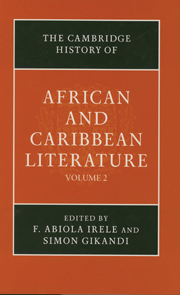Book contents
- Frontmatter
- 23 East African literature in English
- 24 Anglophone literature of Central Africa
- 25 West African literature in English: beginnings to the mid-seventies
- 26 South African literature in English
- 27 African literature in French: sub-Saharan Africa during the colonial period
- 28 North African literature in French
- 29 Francophone literatures of the Indian Ocean
- 30 African literature in Spanish
- 31 African literature in Portuguese
- 32 Popular literature in Africa
- 33 Caribbean literature in French: origins and development
- 34 Caribbean literature in Spanish
- 35 Anglophone Caribbean literature
- 36 The Harlem Renaissance and the Negritude movement
- 37 Postcolonial Caribbean identities
- 38 African literature and post-independence disillusionment
- 39 “Postcolonial” African and Caribbean literature
- 40 Modernism and Postmodernism in African literature
- Index
- References
35 - Anglophone Caribbean literature
Published online by Cambridge University Press: 28 March 2008
- Frontmatter
- 23 East African literature in English
- 24 Anglophone literature of Central Africa
- 25 West African literature in English: beginnings to the mid-seventies
- 26 South African literature in English
- 27 African literature in French: sub-Saharan Africa during the colonial period
- 28 North African literature in French
- 29 Francophone literatures of the Indian Ocean
- 30 African literature in Spanish
- 31 African literature in Portuguese
- 32 Popular literature in Africa
- 33 Caribbean literature in French: origins and development
- 34 Caribbean literature in Spanish
- 35 Anglophone Caribbean literature
- 36 The Harlem Renaissance and the Negritude movement
- 37 Postcolonial Caribbean identities
- 38 African literature and post-independence disillusionment
- 39 “Postcolonial” African and Caribbean literature
- 40 Modernism and Postmodernism in African literature
- Index
- References
Summary
Wilfred Cartey reminds us that a literature grows out of a people’s relation to place. Cartey was a visionary critic of anglophone Caribbean literature, refusing to be silenced or impeded by the sudden onset of physical blindness in his adult life. His vision of the Caribbean understands that people change place as much as place shapes them, and that place is a complicated concept in the light of the widespread Caribbean experience of migration and transcultural identity. Those factors make it the more remarkable that West Indian writers have been able collectively to achieve a large body of outstanding literature, responding to their own visions of the Caribbean from wherever they happen to be, and recreating it in different parts of the world. This despite a history, both individual and collective, both in the region and outside, both historical and contemporary, of intense uprooting, separation and isolation from tradition, home and the voices of the past. Walcott powerfully describes Caribbean place as injured with human experience, “the drowned of the Middle Passage … the butchery of its aborigines … indentured Asians” (1998: 81). Wilson Harris envisions tradition complexly, “For if tradition were dogma it would be entirely dormant and passive but since it is inherently active at all times, whether secretly or openly, it participates the ground of living necessity by questioning and evaluating all assumptions of character and conceptions of place and destiny” (Bundy 1999: 150). Caribbean tradition is thus a complicated interaction of old custom with new modes of being: old traditions being fragmented and often lost by the violence of history.
- Type
- Chapter
- Information
- The Cambridge History of African and Caribbean Literature , pp. 711 - 758Publisher: Cambridge University PressPrint publication year: 2000
References
- 2
- Cited by

